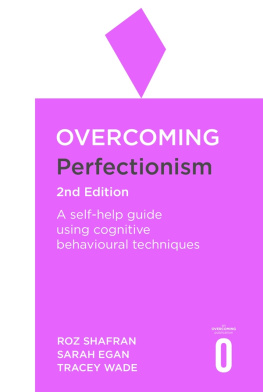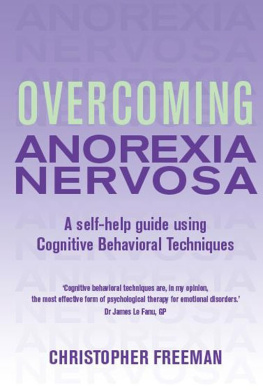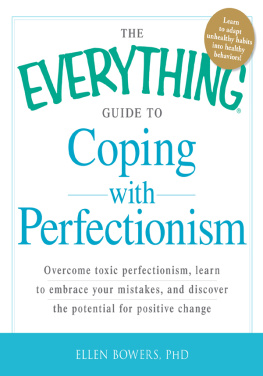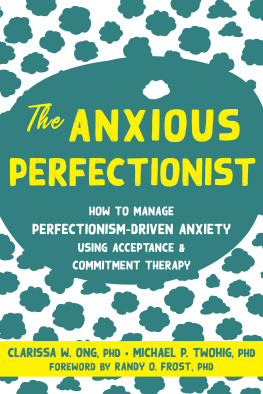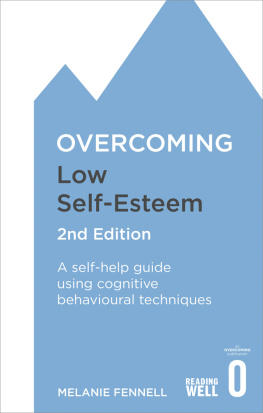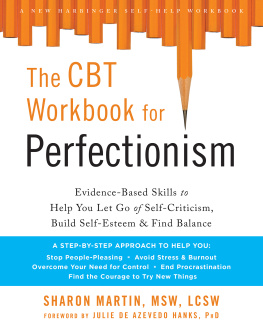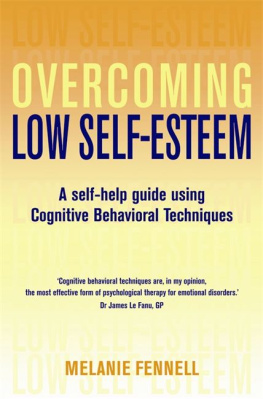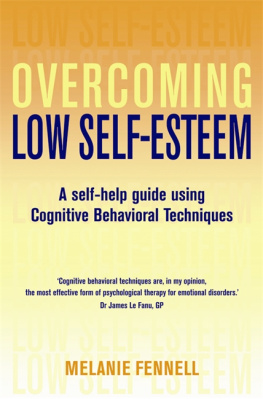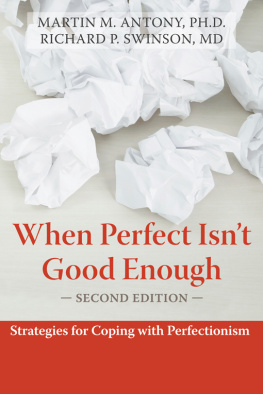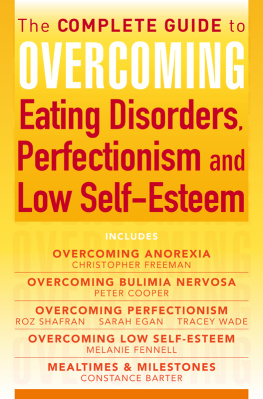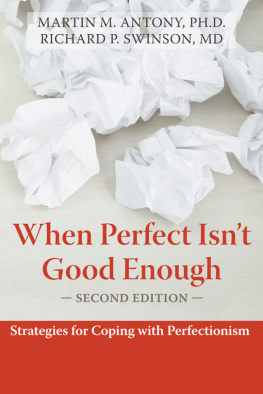Roz Shafran is the Professor of Translational Psychology at the University College London Great Ormond Street Institute of Child Health and a Clinical Psychologist. She is co-author of Cognitive-Behavioral Treatment of Perfectionism (Guilford Press) and has written over 150 research papers on the understanding and treatment of a range of mental health problems including obsessive compulsive disorder, anxiety and eating disorders.
Dr Sarah Egan is a senior research fellow at Curtin University in Perth, Australia, and is also the chair of the World Congress of Behavioural and Cognitive Therapies committee. She has worked for over eighteen years as a clinical psychologist and has published over seventy research papers on perfectionism, eating disorders and anxiety. She is co-author of Cognitive-Behavioral Treatment of Perfectionism (Guilford Press).
Tracey Wade is a Professor of Psychology at Flinders University in Adelaide, Australia. She has worked as a clinician treating eating disorders for the past twenty-five years. She is co-author of Cognitive-Behavioral Treatment of Perfectionism (Guilford Press) and Editor of the Encyclopaedia of Feeding and Eating Disorders (Springer) and has written over 170 papers related to aspects of mental health, including eating disorders, negative affect and perfectionism.
The aim of the Overcoming series is to enable people with a range of common problems and disorders to take control of their own recovery programme.
Each title, with its specially tailored programme, is devised by a practising clinician using the latest techniques of cognitive behavioural therapy techniques which have been shown to be highly effective in changing the way patients think about themselves and their problems.
Many books in the Overcoming series are recommended by the UK Department of Health under the Books on Prescription scheme.
Other titles in the series include:
OVERCOMING ALCOHOL MISUSE, 2ND EDITION
OVERCOMING ANGER AND IRRITABILITY, 2ND EDITION
OVERCOMING ANOREXIA NERVOSA
OVERCOMING ANXIETY, 2ND EDITION
OVERCOMING BODY IMAGE PROBLEMS INCLUDING BODY DYSMORPHIC DISORDER
OVERCOMING BULIMIA NERVOSA AND BINGE-EATING, 2ND EDITION
OVERCOMING CHILDHOOD TRAUMA
OVERCOMING CHRONIC FATIGUE
OVERCOMING CHRONIC PAIN
OVERCOMING GAMBLING ADDICTION, 2ND EDITION
OVERCOMING DEPERSONALIZATION AND FEELINGS OF UNREALITY
OVERCOMING DEPRESSION, 3RD EDITION
OVERCOMING DISTRESSING VOICES
OVERCOMING GRIEF
OVERCOMING HEALTH ANXIETY
OVERCOMING HOARDING
OVERCOMING INSOMNIA AND SLEEP PROBLEMS
OVERCOMING LOW SELF-ESTEEM, 2ND EDITION
OVERCOMING MILD TRAUMATIC BRAIN INJURY AND POST-CONCUSSION SYMPTOMS
OVERCOMING MOOD SWINGS
OVERCOMING OBSESSIVE COMPULSIVE DISORDER, 2ND EDITION
OVERCOMING PANIC, 2ND EDITION
OVERCOMING PARANOID AND SUSPICIOUS THOUGHTS, 2ND EDITION
OVERCOMING PERFECTIONISM
OVERCOMING RELATIONSHIP PROBLEMS, 2ND EDITION
OVERCOMING SEXUAL PROBLEMS, 2ND EDITION
OVERCOMING SOCIAL ANXIETY AND SHYNESS, 2ND EDITION
OVERCOMING STRESS
OVERCOMING TRAUMATIC STRESS, 2ND EDITION
OVERCOMING WEIGHT PROBLEMS
OVERCOMING WORRY AND GENERALISED ANXIETY DISORDER, 2ND EDITION
OVERCOMING YOUR CHILDS FEARS AND WORRIES
OVERCOMING YOUR CHILDS SHYNESS AND SOCIAL ANXIETY STOP SMOKING NOW, 2ND EDITION

ROBINSON
First published in Great Britain in 2010 by Robinson, an imprint of Constable & Robinson Ltd
This revised and updated edition published in 2018 by Robinson
Copyright Roz Shafran, Sarah Egan and Tracey Wade, 2010, 2018
The moral rights of the authors have been asserted.
All rights reserved.
No part of this publication may be reproduced, stored in a retrieval system, or transmitted, in any form, or by any means, without the prior permission in writing of the publisher, nor be otherwise circulated in any form of binding or cover other than that in which it is published and without a similar condition including this condition being imposed on the subsequent purchaser.
A CIP catalogue record for this book
is available from the British Library.
Important Note
This book is not intended as a substitute for medical advice or treatment. Any person with a condition requiring medical attention should consult a qualified medical practitioner or suitable therapist.
ISBN: 978-1-47214-055-5
Robinson
An imprint of
Little, Brown Book Group
Carmelite House
50 Victoria Embankment
London EC4Y 0DZ
An Hachette UK Company
www.hachette.co.uk
www.littlebrown.co.uk
Roz Shafran To my dad, who helped me learn the true meaning of success.
Tracey Wade To my mother and father, who took pleasure in my achievements whilst always giving me their unconditional love.
Sarah Egan To my mum and dad, who encouraged me to try my best but loved me regardless of the outcome; to Peter for his love and support; and to my beautiful daughters Sophie and Chloe, who I love so much and who are my greatest success.
Contents
PART ONE:
Understanding Perfectionism
PART TWO:
Overcoming Perfectionism:
Learning to Change
This book brings together many years of clinical practice and training in the treatment of psychological problems across the world. We are indebted to the people whose work has inspired us and has contributed directly or indirectly to the strategies presented in this book. In particular we acknowledge the contribution of A. Beck, J. Beck, D. Burns, Z. Cooper, M. Fennell, C. G. Fairburn, S. Rachman, G. T. Wilson, Paul Gilbert and Christine Padesky. We are also very grateful to the numerous clients who have shared their stories with us and trusted us to help them get better. Overcoming their difficulties is what inspires us continually to develop new ways to help those who struggle in their daily lives. Finally, we would like to thank our families and friends, who know were not perfect but accept us anyway.
Is this book for you?
When you hear someone say She is such a perfectionist or He just has to do things perfectly, it can be said with either a degree of envy or a degree of exasperation. On the one hand, we admire people who strive for high standards and a high-quality product. On the other hand, we are frustrated by people who persist in perfecting tasks and attending to detail in a way that makes a task take longer without adding substantially to the final outcome. Typically people who fall into this latter group are also causing distress to themselves, as they agonise over the detail of what they are doing and worry about how it might be received. Sometimes they lose confidence in their ability to deliver a worthwhile outcome, whether in work, social situations, leisure pursuits, sport, study or appearance. This type of perfectionism can result in self-criticism, lowered self-esteem and impaired performance. If perfectionism is having any of these consequences in your life, then this book is for you.
This book may be useful not only for anyone who identifies perfectionism as being a problem for them, but also for those with family or friends who have unhelpful perfectionism. It might be that perfectionism is causing problems in itself, or that it is associated with other problems like anxiety, depression or eating difficulties. We emphasise throughout this book that perfectionism is not simply having high standards but relates to your self-esteem being too dependent on striving and achievement, and that this brings with it a range of difficulties. The good news is that this sort of unhelpful perfectionism can be changed without you achieving less.
Next page
